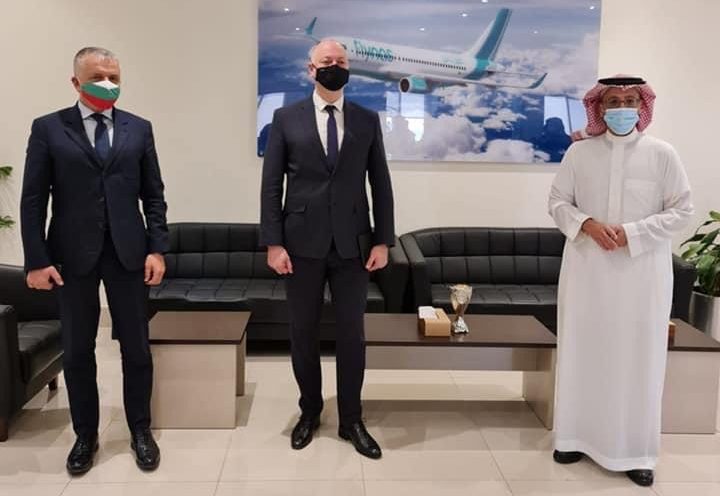Interview with the Bulgarian Minister of Transport, Information Technology and Communications Mr. Rossen Jeliazkov
Rositsa Dorovska & Alexander Woodman
On March 2nd, 2021, on the eve of Bulgaria Liberation Day, the Republic of Bulgaria and the Kingdom of Saudi Arabia signed an Air Transport Memorandum of Understanding (MoU) for direct flights. The delegation led by the Bulgarian Minister of Transport, Information Technology and Communications, His Excellency Mr. Rossen Jeliazkov, was received by his counterpart, the Minister of Transport of Saudi Arabia, His Excellency Mr. Saleh bin Nasser Al-Jasser.

The Memorandum of Understanding has become a significant step in strengthening bilateral cooperation and is expected to benefit Saudi-Bulgarian tourism and economic partnership. The operation of direct flights between the countries was discussed with the CEO of Flynas, Mr. Bander Abdulrahman Al-Mohanna. As part of this state visit, the Bulgarian delegation also met with representatives of the Public Investment Fund of Saudi Arabia and the Chairman of the Board of Directors of the Saudi Space Commission (SSC), His Royal Highness Prince Sultan bin Salman bin Abdulaziz Al Saud.
What are the priorities of the Memorandum of Understanding (MoU) for direct flights between Saudi Arabia and Bulgaria? How will this step support bilateral economic activity?
The development of air transport between Bulgaria and Saudi Arabia will increase passenger and cargo flow. This, in turn, will contribute to the intensification of two-sided relations at all levels. The draft agreement meets the requirements for an agreement harmonized with European Union (EU) legislation. It contains the fundamental principles of EU treaties, such as the right of establishment and fair competition and so-called standard clauses such as tariffs and ground handling, among others. The project contains the required conditions for the permanent and mutually beneficial operation of regular international airlines in the modern conditions of international standards and requirements for technical safety, security, and economic efficiency.

What impact will this agreement have on transport logistics and supply chain management between Saudi Arabia, Bulgaria, and the Middle East?
The development of air transport between Bulgaria and Saudi Arabia, and direct flights will stimulate bilateral relations by reducing distance and facilitating travelling. Moreover, the air transport agreement will help to create conditions for direct flights, leading to increased passenger and cargo transportation. Thus, this MoU contains an article that regulates intermodal transport. The designated airline(s) of each Contracting Party shall be permitted to employ, in connection with air transport of passenger and cargo, any intermodal transport to or from any points in the territories of the Contracting Parties or third countries. Such airline(s) may choose to operate its own intermodal service or provide it through arrangements, including code-sharing, with other airlines following the laws and regulations in force in the territory of the Contracting Party concerned. Intermodal services can be offered as end-to-end services and at a single price for combined air and intermodal transport, given that passengers and shippers will be informed of the providers of the respective transport.

Since 2019, the General Authority of Civil Aviation of Saudi Arabia has implemented a number of e-services to upgrade the aviation facilities. Can you discuss the importance of digitalization, specifically in the transport sector, in addition to customer convenience?
Digital technologies provide huge potential for optimizing the transport system and opening up new opportunities for manufacturing and services. They support the integration of transport with other systems of the economy, such as energy, and significantly increase the sector’s efficiency. In air transport, work is underway to deploy the Single European Sky Air Traffic Management Research Program (SESAR), which aims to ensure highly efficient air traffic management for the EU by 2030, enabling safe and environmentally sound operation and development of air transport.
Work on the timely and synchronized implementation of the program functionality will continue. Work will also continue on competitiveness and sustainability programs in the European aviation sector to develop aircraft and engines with greater efficiency and lower noise levels, remotely controlled flight systems, digitization, and multimodal solutions such as automated ground handling services, as well as an integrated ticketing system.




